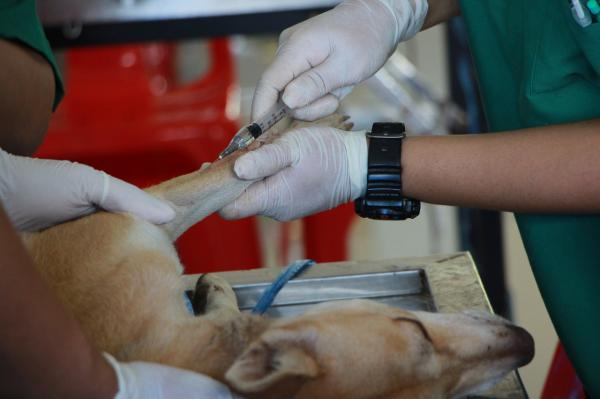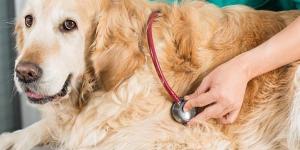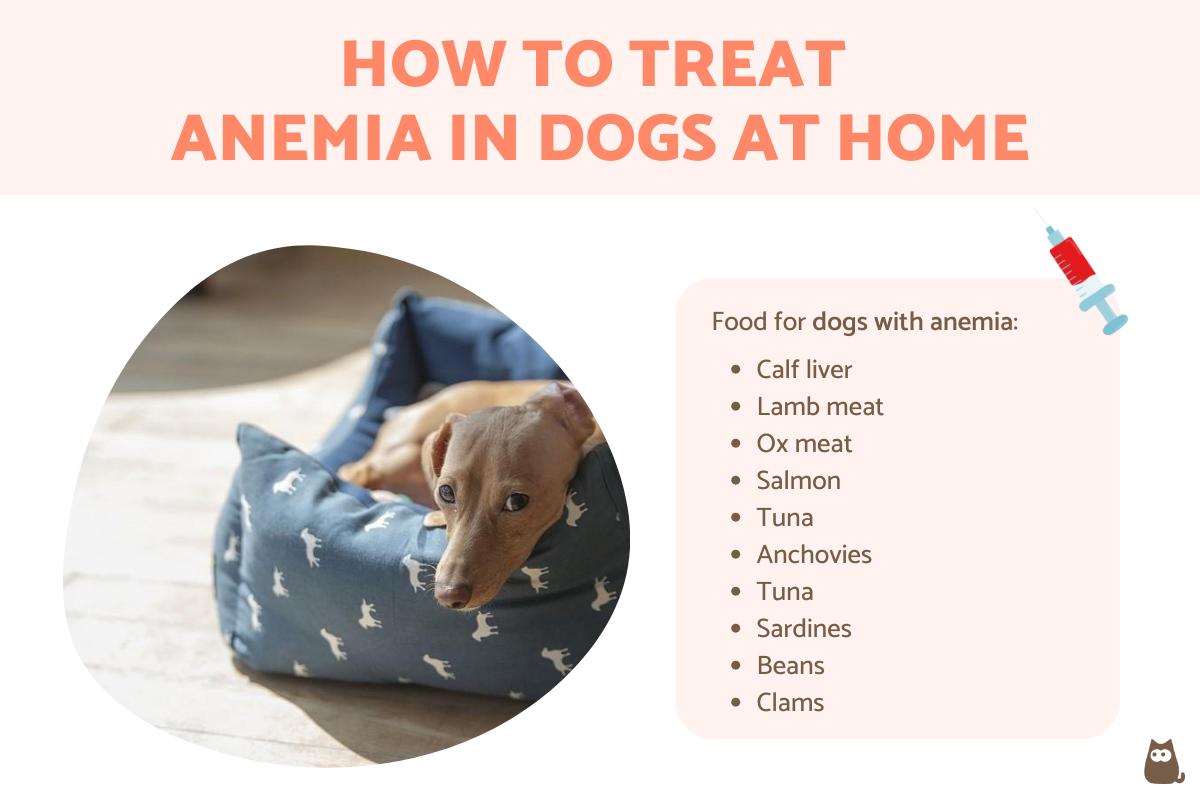How to Treat Anemia in Dogs at Home



See files for Dogs
Canine Anemia is directly related to a low red blood cell count in a dog's blood. It can occur for various reasons, ranging from injuries and the presence of parasites to canine parvovirus or the excessive appearance of antibodies. A vet is the only professional who can effectively diagnose and treat this disease, which can easily be confused with other common dog illnesses. Once anemia in dogs has been diagnosed, you will need to follow the veterinarian's treatment plan. This will involve treating the underlying cause of anemia, but additional care will need to be taken to improve the dog's well-being.
In this way AnimalWised can help you know how to treat anemia in dogs at home. This home treatment is in the form of diet and care which anemic dogs need as part of specialized treatment. This is supplemental to veterinary treatment and you will need to discuss your options with a veterinarian before administering them.
What is anemia in dogs?
The first thing to understand about anemia in dogs is that it is not a disease in itself. It is a condition which is characterized by a count of low red blood cells. This varies in severity, but it can result in dangerously low hemoglobin levels. As hemoglobin transports oxygen from the lungs to different parts of the body, low red blood cells can have various negative consequences on the health of the dog.
Anemia often presents as a symptom of a disease or other condition which affects the dog's health. The red blood cells are made in the bone marrow of dogs and last about about three months before they need to be replaced.
The causes of anemia in dogs are varied. While diet can help to treat the symptoms of anemia, not all causes are related to what the dog eats. However, a diet deficient in iron or other nutrients can at the very least be a contributing factor. Other causes of anemia in dogs include:
- Extreme blood loss, such as that caused by physical trauma
- Side effects of medication which cause internal bleeding or ruptured ulcers
- Cancer can be a factor in development of anemia
- Diseases which cause the immune system to attack red blood cells
- Kidney disease and other organ failure
- Infectious diseases such as Lyme disease and ehrlichiosis spread by tick bites
- Other parasitical infestations which lead to disease
- Gastrointestinal diseases which affect metabolism
- Hypothyroidism
- Poisoning or intoxication
Many of the causes of anemia in dogs do not have obvious symptoms in their beginning stages. For example, kidney failure can progress to a large extent before observable symptoms appear. If it has developed, the dog will likely show the following symptoms of anemia:
- Lethargy
- Gum discoloration
- Disinclination to exercise
- Appetite loss
- Weight loss
- Dark colored stools
- Eating dirt
If you see any of these signs and symptoms persist for more than 24 hours, you should take your dog to the veterinarian. They will be able to diagnose the underlying cause and initiate the correct course of treatment.
Learn more about some of the underlying causes of canine anemia by looking at our articles on causes of kidney disease in dogs and how long does a dog live with parvovirus?
Treating anemia in dogs at home
The treatment of anemia in dogs involves treating the underlying condition. This may involve taking medication, implementing lifestyle changes or a mixture of both. Changing the dog's diet may be beneficial, but this will depend on the condition. For this reason, you will need to speak to your veterinarian before implementing an anemic dog diet.
If your dog is anemic and want to know what type of dietary options are available, keep reading. We will show you some home treatments for anemia in dogs which can supplement, but never replace, veterinary medical treatment.

Food for dogs with anemia
Diet plays a very important role for dogs suffering from any type of anemia, such as hemolytic anemia in dogs. This is because they usually have significant deficiencies in protein, iron and vitamins. One exception is cases of anemic internal bleeding caused by an ulcer. In these cases, the dog will be treated with acid pumps and antibiotics. The following foods should help make them stronger and recover necessary nutrients.
Dog food high in iron is essential for a dog that is suffering from anemia. It is estimated that dogs need 1 milligram of iron for every 12 grams of food. High-quality foods are most recommended, because they allow the animal to correctly absorb the required nutrients. Some iron-rich foods for dogs include:
- Calf liver
- Lamb meat
- Ox meat
- Salmon
- Tuna
- Anchovies
- Tuna
- Sardines
- Beans
- Clams
- Cockles
Vitamin C helps the animal to correctly absorb the iron, so it will also be a good idea to think of foods which contain high amounts of it. Sunlight is another factor which also helps the animal to absorb this important vitamin. Some foods which are rich in vitamin C are:
- Peppers
- Cantaloupe
- Cauliflower
- Spinach
- Raw cabbage
Proteins are hugely beneficial for anemic dogs. They allow them to gain more strength and energy, helping to get over the disease with greater ease. Some foods containing protein that you can easily find at home include:
- Chicken
- Eggs
- Rice
- Horse mackerel
- Mackerel
- Bream
- Brussels sprouts
- Broccoli
- Spinach
Vitamin B is another nutritional supplement which is very useful for dogs recovering from anemia. Many of the foods mentioned above contain this vitamin, but here are some more with which you can enrich an anemic dog's diet.
- Pork kidneys
- Lamb brain
- Calf heart
- Mackerel
- Oats
- Rice flour
- Apple
- Watermelon
- Potatoes
- Sweet potatoes
- Dandelion
- Banana
A homemade diet for an anemic dog
This homemade recipe for dogs is nice and easy to make and includes a little bit of all of the ingredients listed above, specifically related to a dog anemia diet. The quality of the products and the homemade preparation will help to get your dog to eat, which is one of the most common problems of dogs with anemia.
Get hold of the following ingredients:
- 200 grams rice
- 1 red bell pepper
- 1 egg
- 200 grams salmon
- 1 sweet potato
Follow this simple step by step:
- Place a pot full of water over the hob and add a drizzle of olive oil.
- When the water is boiling, add the rice, which will take roughly 20 minutes to cook (check packaging).
- Meanwhile, cut the other ingredients into pieces which are suitable for the size of your dog. It is most common to dice them up into small pieces.
- When there is 10 minutes left for the rice to cook, add the remaining ingredients: pepper, egg, salmon and sweet potato.
- When it has finished cooking, simply remove the rice and the other ingredients and leave them to stand until they cool down to at least room temperature.
- Crush the egg (shell included) and mix all the ingredients well.
- Use the appropriate amount for the size of your dog.
My Dog is anemic and won't eat
Seeing your dog's health deteriorating is a horrible experience - even when you make them delicious and tasty meals, this often won't be enough for a sick animal. If this is the case with you, we at AnimalWised will give you some tricks that can help you get your dog to eat:
- Try encourage your dog to drink chicken stock without salt or other seasonings instead of water. This will hydrate it and give it lots of protein. You will have to ensure there are no toxic ingredients in the broth, likely meaning you will have to make it yourself.
- If your dog is happy to drink the chicken stock, try to include some rice in it and add some vegetables or fruits such as apple or cauliflower so that they get some vitamins.
- If your dog has no problems eating fruit, try to give them small pieces of watermelon and melon, which are rich in water and vitamins. However, try not to use too many as they have a high sugar content.
- Whilst it isn't particularly digestible, some dogs enjoy eating soft cheese without salt, which gives them an excellent boost of protein.

Treating anemia in dogs at home
Anemic dogs feel weak and sensitive due to the lack of vitamins and iron in their bodies. You should therefore take caution during walks, trying not expose them to excessive heat, exercise or extremely long walks.
Try getting them to drink fresh water or soup frequently to prevent them from getting dehydrated during the day. This can give them a greater urge to go to the toilet, so you should give them more short walks during the day.
Don't forget that one of the most common causes of anemia is the appearance of external or intestinal parasites. Checking your dog for fleas every month and deworming them every three months is a good way of stopping this from happening again. Sticking to the vaccination schedule for puppies and dogs and the obligatory biannual vet visit will be other ways of preventing the disease from returning.
Treating canine anemia at home with diet and care can help you supplement the treatment provided by the veterinarian. This is always after veterinary consultation since they will need to first diagnose the dog with the condition. This can apply to other diseases in dogs. See how the foods for dogs with kidney disease can also help you to manage renal failure in dogs.

This article is purely informative. AnimalWised does not have the authority to prescribe any veterinary treatment or create a diagnosis. We invite you to take your pet to the veterinarian if they are suffering from any condition or pain.
If you want to read similar articles to How to Treat Anemia in Dogs at Home, we recommend you visit our Other health problems category.







 Would love advice what to feed my Yorkie, who is anemic and suffers from renal failure. She loves blueberries, strawberries, rice, sweet and white potatoes. What can I feed her to help her conditions? Thank you
Would love advice what to feed my Yorkie, who is anemic and suffers from renal failure. She loves blueberries, strawberries, rice, sweet and white potatoes. What can I feed her to help her conditions? Thank you

 Please tell me about the report of my 6 year old German shepherd dog
Please tell me about the report of my 6 year old German shepherd dog

 My 14 months old GSD, Winter, was bleeding internally for weeks. No symptoms. Then all of the sudden she was peeing blood and went from tons of energy, to completely broken down. To the vet/hospital, admitted for 4 days, blood work showed her blood was not clotting, x-ray showed all her organs were pushed to her spine and the back of her body, ultrasound confirmed she needed an emergency splenectomy (it was contorted, rare, but does happen in big breeds). Due to this she is currently anemic. Your article helped me relax a little and focus on building her back up again. She loves the recipe you shared!! I am feeding her everything that's suggested and she is being a good girl and eating everything. Thank you so much!!
My 14 months old GSD, Winter, was bleeding internally for weeks. No symptoms. Then all of the sudden she was peeing blood and went from tons of energy, to completely broken down. To the vet/hospital, admitted for 4 days, blood work showed her blood was not clotting, x-ray showed all her organs were pushed to her spine and the back of her body, ultrasound confirmed she needed an emergency splenectomy (it was contorted, rare, but does happen in big breeds). Due to this she is currently anemic. Your article helped me relax a little and focus on building her back up again. She loves the recipe you shared!! I am feeding her everything that's suggested and she is being a good girl and eating everything. Thank you so much!!


